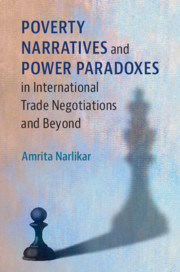Crossref Citations
This Book has been
cited by the following publications. This list is generated based on data provided by Crossref.
Narlikar, Amrita
and
Sottilotta, Cecilia Emma
2021.
Pandemic narratives and policy responses: west European governments and COVID-19.
Journal of European Public Policy,
Vol. 28,
Issue. 8,
p.
1238.
Berger, Tobias
2022.
Worldmaking from the margins: interactions between domestic and international ordering in mid-20th-century India.
European Journal of International Relations,
Vol. 28,
Issue. 4,
p.
834.
Narlikar, Amrita
2022.
India’s foreign economic policy under Modi: negotiations and narratives in the WTO and beyond.
International Politics,
Vol. 59,
Issue. 1,
p.
148.
Hopewell, Kristen
2022.
Emerging Powers, Leadership, and South–South Solidarity: The Battle Over Special and Differential Treatment at the WTO.
Global Policy,
Vol. 13,
Issue. 4,
p.
469.
Weinhardt, Clara
and
Schöfer, Till
2022.
Differential treatment for developing countries in the WTO: the unmaking of the North–South distinction in a multipolar world.
Third World Quarterly,
Vol. 43,
Issue. 1,
p.
74.
Linsi, Lukas
2022.
Economic Narratives and the Legitimacy of Foreign Direct Investments.
Politics and Governance,
Vol. 10,
Issue. 3,
p.
98.
Venkatachalam, Meera
Nielsen, Kenneth Bo
and
Modi, Renu
2023.
The politics of gifts and reciprocity in South–South Cooperation: The case of India's Covid‐19 diplomacy.
Journal of International Development,
Vol. 35,
Issue. 4,
p.
600.
Forough, Mohammadbagher
Dahbi, Khalil
Waterman, Alex
and
Woertz, Eckart
2023.
Narratives of Global Order and Re-Ordering from the Global South.
Antíteses,
Vol. 16,
Issue. 31,
p.
292.
2023.
China and the WTO.
p.
181.
Hopewell, Kristen
2023.
China and the WTO.
p.
183.
Eliasson, L. Johan
and
Garcia‐Duran, Patricia
2023.
New is old? TheEU's Open, Sustainable and Assertive Trade Policy.
Global Policy,
Vol. 14,
Issue. S3,
p.
9.
Thérien, Jean-Philippe
2024.
The North–South Distinction: From Consensus to Contestation.
Global Studies Quarterly,
Vol. 4,
Issue. 4,
Bhandary, Rishikesh Ram
and
Kuhl, Laura
2024.
The role of institutional design in mobilizing climate finance: Empirical evidence from Bangladesh, Brazil, Ethiopia, and Indonesia.
PLOS Climate,
Vol. 3,
Issue. 3,
p.
e0000246.
Barros Leal Farias, Deborah
2024.
Unpacking the ‘developing’ country classification: origins and hierarchies.
Review of International Political Economy,
Vol. 31,
Issue. 2,
p.
651.
Chakraborty, Debashis
and
Dey, Oindrila
2024.
Influence of WTO and Global Dynamics on Trade Flows.
p.
1.
2025.
International Organizations and Peaceful Change in World Politics.
p.
151.
Eliasson, L. Johan
and
Garcia-Duran, Patricia
2025.
EU Foreign Policy in a Fragmenting International Order.
p.
27.
Sinha, Aseema
2025.
International Organizations and Peaceful Change in World Politics.
p.
249.



